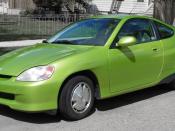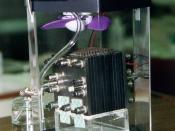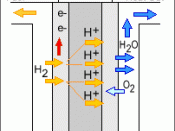You are cruising down the road at 60 mph in the newest sports car; you step on the gas expecting to hear a roar from the engine, instead, you hear nothing at all. You think to yourself for a brief moment, "there must not be an engine." You know that that isn't correct as you try to re-inflate your lungs due to the g-forces that you experienced during acceleration. What in the world? Is this a dream? No, it is the future of automobile technology. No doubt you have heard talks of "fuel cells," and "hybrid automobiles." To most people, this is a foreign language. There is only one-way to clear up the confusion, that is to explain what they are, how they work, what problems there are with them, and how readily available the technology is.
A fuel cell is a device that converts hydrogen and oxygen into water.
When this change occurs, energy is created in the form of heat and more importantly electricity. It is essentially a battery that can be recharged while using it. There is one big advantage over batteries. A fuel cell uses hydrogen and oxygen instead of electricity to recharge itself. A fuel cell has water as its only byproduct. The water that leaves the tailpipe is clean enough to drink by most people's standards. Environmentally sound? You better bet your britches. A hybrid automobile is a little different. A hybrid automobile is a vehicle that combines a gasoline engine and an electric motor. These cars are not as efficient as the fuel celled vehicles and are not as environmentally pure. However they are considered to be ultra-efficient by today's standards. The Honda Insight, a hybrid automobile, gets 66 mpg on the highway; this is compared to 37 mpg on a Honda...


